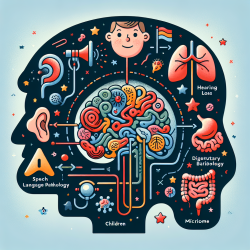Understanding Alzheimer’s Disease in Bilingual Latinos
As a practitioner in the field of speech-language pathology and neuropsychology, understanding the nuances of diagnosing and treating Alzheimer’s disease in bilingual Latino populations is crucial. The recent research article, "Alzheimer’s Disease in Bilingual Latinos: Clinical Decisions for Diagnosis and Treatment Planning," provides invaluable insights into the complexities of this task. This blog aims to distill key findings from the study to enhance clinical practice and encourage further research.
Key Findings and Clinical Implications
The study highlights the heterogeneity in the clinical expression of Alzheimer’s disease among bilingual Latino/as, emphasizing the need for culturally and linguistically congruent neuropsychological assessments. Here are some critical takeaways:
- Timely and Accurate Diagnosis: Latino/a older adults are 1.5 times more likely to develop Alzheimer’s disease than non-Hispanic Whites. Yet, under-representation in research studies obscures the neuropsychological markers specific to this population. Timely diagnosis is crucial for effective intervention.
- Language and Cultural Considerations: Bilingualism can alter the clinical expression of Alzheimer’s, often presenting as non-amnestic cognitive changes. It’s vital to assess patients in both languages to capture accurate cognitive profiles.
- Interdisciplinary Approach: Collaboration across disciplines is essential. Partnering with culturally congruent community organizations and healthcare providers can enhance care and support for patients and families.
Improving Clinical Practice
Practitioners should integrate these insights into their clinical practice by:
- Conducting comprehensive language assessments to determine the best language(s) for evaluation.
- Utilizing culturally sensitive tools and norms for neuropsychological assessments.
- Engaging in interdisciplinary collaborations to provide holistic care.
Encouraging Further Research
While this study provides a foundation, there is a need for further research to develop more sensitive diagnostic tools and interventions tailored to bilingual Latino populations. Researchers are encouraged to explore the impact of bilingualism on cognitive decline and to develop culturally congruent interventions.
To read the original research paper, please follow this link: Alzheimer’s Disease in Bilingual Latinos: Clinical Decisions for Diagnosis and Treatment Planning.










